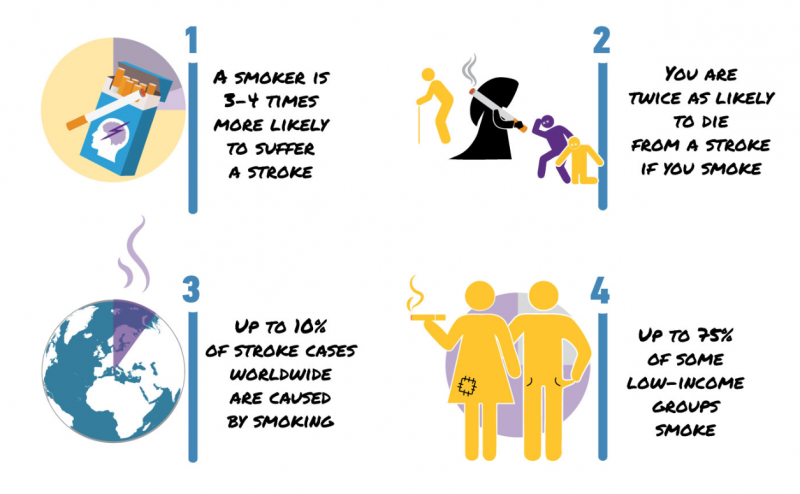
Jun 4, 2019
Each 31 May, the World No Tobacco Day is being celebrated around the globe by raising awareness about the harmful and deadly effects of smoking and the use of tobacco products. SAFE is trying to raise awareness about the dangers of smoking for another very important reason- Smoking is one of the modifiable stroke risk factors. Many studies suggest smoking almost doubles the risk of stroke and subarachnoid haemorrhage (SAH), a life-threatening type of stroke caused by bleeding into the space surrounding the brain (1). Long-term exposure to nicotine has many negative health effects. Some, such as a persistent cough, are noticeable. Whereas the hidden damage that happens within the brain is not often apparent until it’s too late. Research shows that the parts of a smoker’s brain that control everyday tasks, such as hand-to-eye coordination, are reduced in volume, which can impair its function (2).
According to the Statement given by EU Commissioner for Health and Food Safety, Vytenis Andriukaitis, on a global level, the figures are staggering – there are more than 7 million tobacco-associated deaths around the world each year. This is one of the main reasons why the EU and its Member States are active supporters of a global health treaty – the Framework Convention on Tobacco Control of the World Health Organisation.
“Tobacco consumption is the single largest avoidable health risk, and the most significant cause of premature death in the EU, responsible for nearly 700,000 deaths annually. This is not just a dry number. These are our family members, friends, colleagues. I am particularly concerned about young people taking up vaping and various new products like heated tobacco products and e-cigarettes, which are increasingly being marketed with misleading claims. 29% of young Europeans aged 15-24 are smoking. How many are using alternatives damaging their young lungs?” asked Mr Andriukaitis.
Up to 10% of stroke cases worldwide are caused by smoking
According to the World Health Organisation, smoking is thought to cause around 10% of cardiovascular disease worldwide. In 2008, the highest overall prevalence for smoking was estimated to be in the European Region, at nearly 29%. (3) Thankfully, in Europe, the death rate has fallen significantly over the last two years, but the number of people living with disabilities, as a result of stroke, continues to be a huge problem (4).
“The EU is working hard to protect citizens from the hazardous effects of tobacco use. One of our key milestone measures in the EU’s fight against illicit trade in tobacco products – the European systems of tobacco traceability and security features – became operational on 20 May. This means that consumers will soon see new traceability markings on the packs, together with the required security features. The traceability markings will enable national authorities to track and trace the movements of tobacco packs across the legal supply chain in the EU. In addition, security features will enable public authorities and citizens to determine if a tobacco product on the market is genuine or illicit” said Mr Andriukaitis in his official statement.
In conclusion, we all know smoking is bad for us. It’s been linked with all kinds of diseases, including stroke. But sometimes even the cold hard facts aren’t enough to make us want to kick the habit. If you’re considering cutting down or giving up, please visit SAFE’s website www.strokeprevention.info dedicated to education about stroke risk factors and check out five tips for quitting smoking.
References:
- James F. Meschia, MD et al. (2014). Guidelines for the Primary Prevention of Stroke. A statement for healthcare professionals from the American Heart Association/American Stroke Association. DOI: 10.1161/STR.0000000000000046. Stroke, 45: 3754-3832.
- Lim, T. S., Lee, J. S., Yoon, J. H., Moon, S. Y., Joo, I. S., Huh, K., & Hong, J. M. (2017). Cigarette smoking is an independent risk factor for post-stroke delirium. BMC neurology, 17(1), 56.
- Thun MJ, Apicella LF, Henley SJ. (2000). Smoking vs other risk factors as the cause of smoking-attributable deaths: confounding in the courtroom. JAMA, 284:706–712
- https://www.stroke.org.uk/sites/default/files/the_burden_of_stroke_in_europe_-_challenges_for_policy_makers.pdf
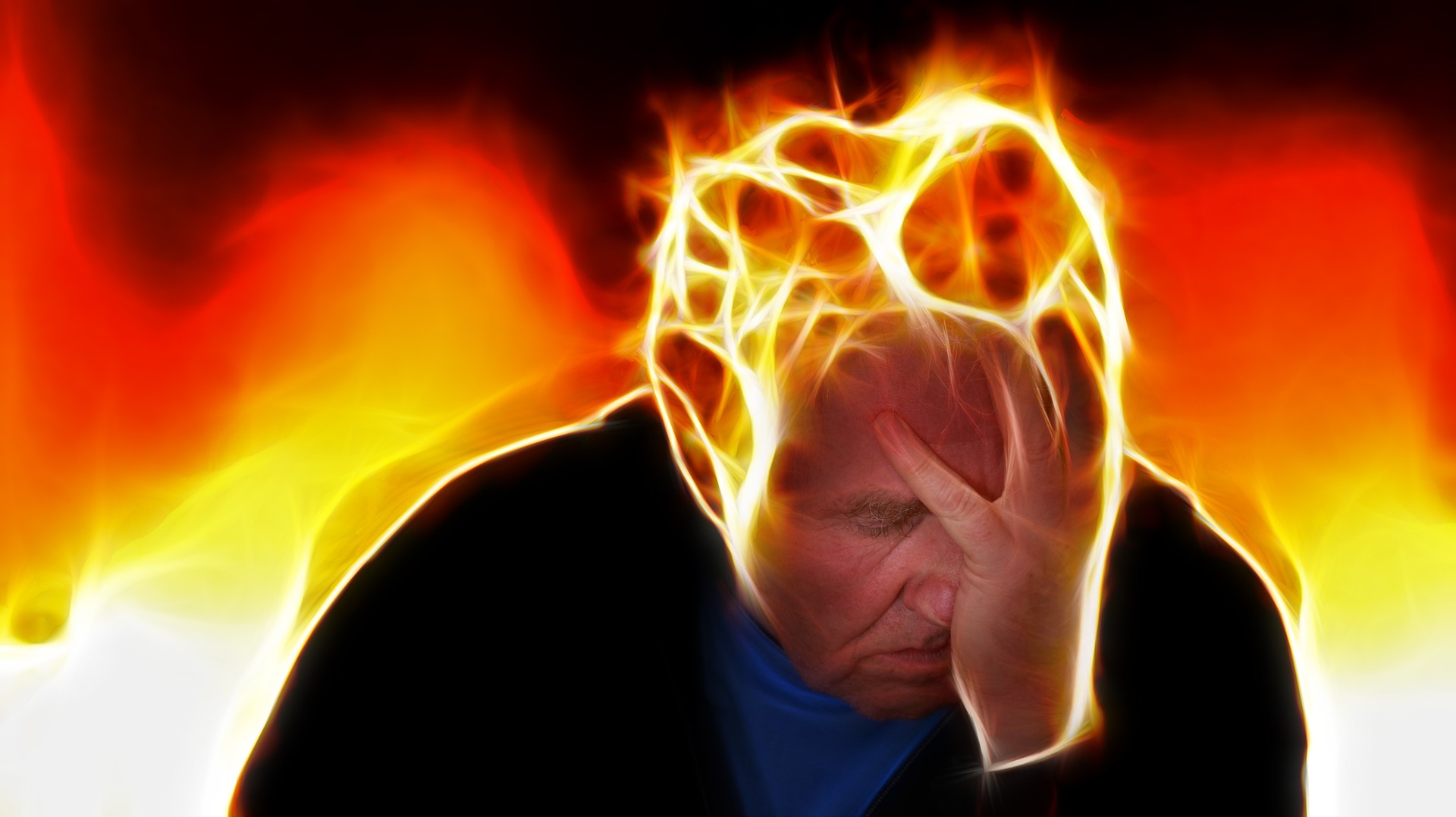
Jun 3, 2019
Written by Tom Balchin | First published on https://arni.uk.com
Stroke is one of many conditions that can lead to seizures, or epilepsy. You may think of these as ‘having fits’. In the UK this condition affects just under 1% of the population. Around 5% of people who have a stroke will have a seizure within the following few weeks. These are known as acute or onset seizures and normally happen within 24 hours of the stroke.
The good news is that your risk of having a seizure lessens with time following your stroke. But, you’ve really got to take care. I see people regularly who have fits for the first time. It’s never fun, but luckily, as someone who has had controlled epilepsy for over 20 years I know exactly how to identify these very early (it’s not that hard really). Quickly get the person to the floor, gently, into the recovery position and call for an ambulance. If you have a list of all their medications on hand to tell the paramedic, that would be ideal.
You are more likely to have had one if you have had a severe stroke, a haemorrhagic stroke or a stroke involving the part of the brain called the cerebral cortex. My own epilepsy came only after subarachnoid haemorrhage, (an uncommon, very serious and often fatal type of stroke caused by bleeding on the surface of the brain)
The causes of seizures are complex. Cells in the brain communicate with one another and with our muscles by passing electrical signals along nerve fibres. If you have epilepsy this electrical activity can become disordered and a sudden abnormal burst of electrical activity in the brain can lead to a seizure.
There are over 40 different types of seizures that can occur, but the most common ones are partial seizures or generalised seizures.
Partial or focal seizures only occurs in part of your brain. You may remain conscious and aware of your surroundings during a partial seizure (called a simple partial seizure) or you may become confused and unable to respond (a complex partial seizure). The symptoms you experience during a partial seizure will depend on which part of your brain has been affected. You may feel changes in sensation such as a tingling feeling, which spreads to other parts of your body.
Commonly people experience a rising feeling in their stomach (a bit like when you go over a humpback bridge). This is called an ‘epigastric rising sensation’. You may also experience uncontrollable stiffness, twitching or turning sensation in a part of the body such as your arm or hand, and/or disturbances in your vision, such as seeing flashing lights.
You can read the full article here.
Image credits: Pixabay.com
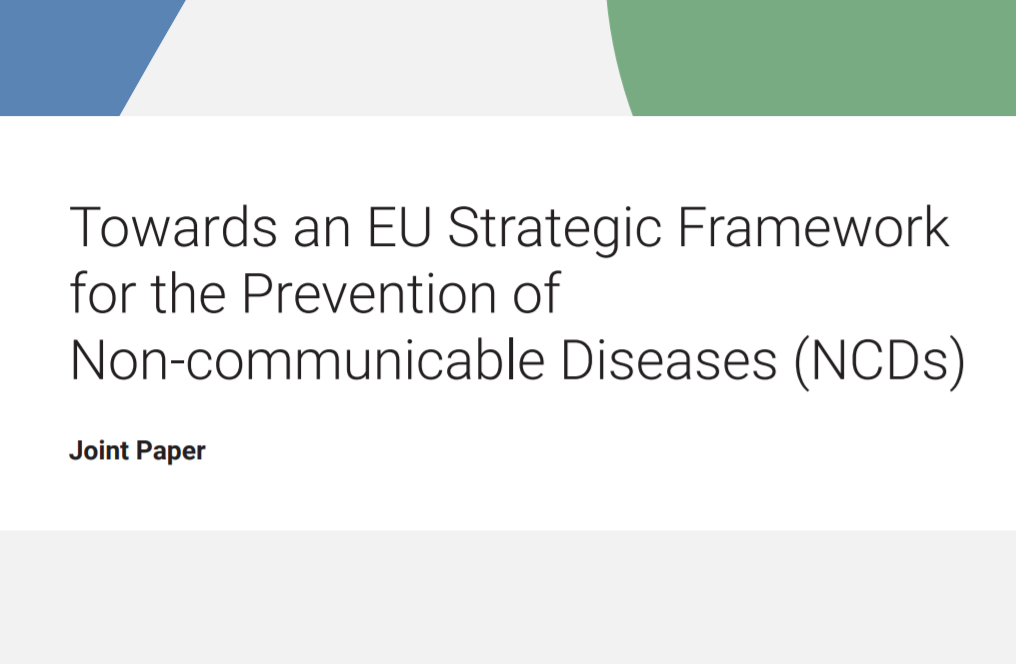
May 31, 2019
The European Chronic Disease Alliance (ECDA), the European Public Health Alliance (EPHA) and the NCD Alliance publish the paper “Towards an EU-Strategic Framework for the Prevention of Non-communicable Diseases” concluding that a new EU strategic framework to prevent non-communicable diseases (NCDs) is needed to address chronic diseases, the 21st century’s foremost health threat.
With 70% of respondents to a recent EU Barometer survey wanting to see more EU action on health and with epidemic levels of NCDs undermining people’s well-being, healthcare systems, and Europe’s economic and social prosperity, preventing NCDs should be a main priority for the next European Commission.
The mandate 2019-2024 is an opportunity to act upon commitments made at the UN High Level Meeting on NCDs in September 2018 and follow on the EU Reflection Process on Chronic Diseases to deliver concrete solutions to respond to the main common risk factors. While progress is made on reducing premature mortality from NCDs, longer lives do not necessarily translate into healthy lives.
With stroke being such an important topic among other non-communicable diseases, SAFE and ESO recently organised a panel discussion in the Committee of Regions in Brussels, under the Patronage of The Romanian Presidency, exploring the role of policy in tackling stroke. During the panel discussion, patient representatives and clinical experts called on the EU Institutions to recognize the burden of stroke as its own incredibly important entity, rather than diluting it in the wider classification of cardiovascular diseases. Panelists representing patients and clinicians also called for the EU to facilitate discussions between its Member States on the implementation of the Stroke Action Plan for Europe. As a next step to this meeting, SAFE and ESO begun a follow-up with speakers and participants to move forward with the identified opportunities. The immediate action that came as a result of this panel discussion was SAFE’s participation in the CHRODIS+ Conference, held in Budapest, Hungary on 15 May 2019. At this important meeting, SAFE was represented by Grethe Lunde, SAFE Board Member and a stroke survivor from Norway. SAFE actively participated in discussions on topics such as patient involvement, multi-morbidity, integrated care and employment.
Europeans spend between a quarter and a fifth of their lives in ill-health. 700 billion EUR is spent on treating NCDs in the EU each year – although many chronic diseases are to a considerable degree preventable. The paper proposes basic principles, priorities and actions for such an EU strategic framework, setting out a roadmap to make change happen. For more information, please contact: info@alliancechronicdiseases.org or epha@epha.org.
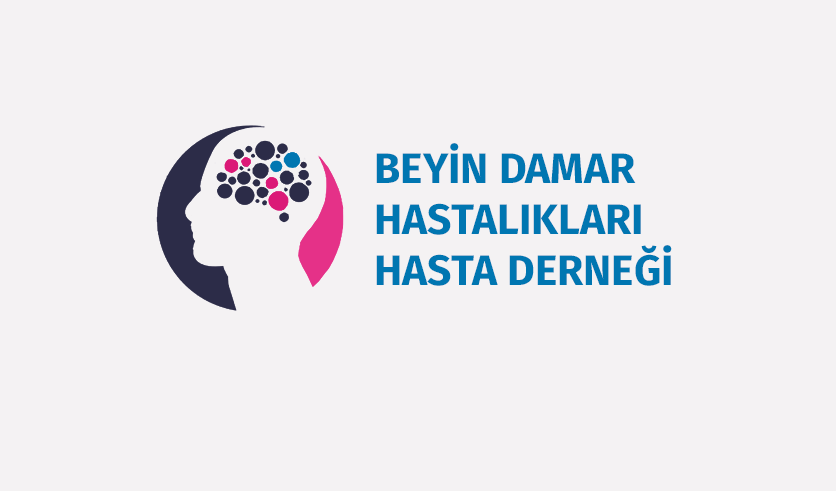
May 31, 2019
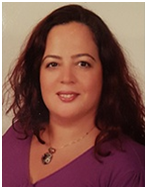 “In our country, our patients are facing several problems after stroke. The number of physical therapy units is adequate, however, we should pay extra attention for the subjects such as lack of training and methods, inadequate speech rehabilitation therapy, lack of environmental physical conditions for stroke cases, and often overlooked dementia and depression after stroke” said Füsun Mayda Domaç, Assoc. Prof, MD, Msc and Vice President of BEYINDER, Turkish Stroke Support Organisation.
“In our country, our patients are facing several problems after stroke. The number of physical therapy units is adequate, however, we should pay extra attention for the subjects such as lack of training and methods, inadequate speech rehabilitation therapy, lack of environmental physical conditions for stroke cases, and often overlooked dementia and depression after stroke” said Füsun Mayda Domaç, Assoc. Prof, MD, Msc and Vice President of BEYINDER, Turkish Stroke Support Organisation.
SAFE: What is one issue related to the life after stroke in your country that you think needs special attention?
FMD: One of the most noteworthy issues is the establishment of a number of rehabilitation centers by government incentives in Turkey. Although the physical facilities and numbers of the centers are adequate, the lack of physical therapists and physiotherapists, who are well equipped for neurorehabilitation and especially for stroke rehabilitation, is quite lacking. The number of physical therapy sessions that the Ministry of Health has provided free of charge in patients after stroke is insufficient. Although the physicians are willing to start treatment in patients in the early period, the number of free sessions and an inadequate number of equipped personnel negatively affect the success rates. In our country, physical factors create difficulties for the cases of stroke. It is extremely important to reintroduce stroke survivors to an active, disability-free life with an intensive rehabilitation program.
Other important issues we have come across in most stroke survivors are the isolation of social and work environment, fear of not recovering, and psychiatric problems such as depression and anxiety. Besides, vascular dementia can develop due to localization and severity of stroke. However, because we need to examine a large number of patients in a short time due to health policies in outpatient clinics, urgent and important complaints are considered at the forefront and psychiatric cognitive problems can be ignored. This situation complicates and delays clinical recovery in patients.
SAFE: What would be the solution, i.e. what is your organisation’s position regarding this issue?
FMD: The short duration of rehabilitation treatment and lack of adequate qualified personnel negatively affect the healing process even though the physical therapy centers are sufficient. In this context, in the neurorehabilitation, it will be helpful to prepare a training CD of physical therapy applications for stroke which explains practices in detail. In addition, neurology and physical therapy branches need to come together and exchange information on neurorehabilitation with joint meetings. Training sets can be prepared in cooperation with the Ministry of Health, and detailed brochures about hints and issues to be considered during physical therapy can be prepared and distributed. The Ministry of Health may be asked to supervise physical therapy centers in more detail and to support fully-equipped rehabilitation centers for stroke rehabilitation. The number of free service periods and sessions can be increased by discussing the necessity of having a long-term and intensive treatment protocol after stroke with the Ministry of Health. Beyinder works intensively on all these solutions.
Due to the health policies in our country, there is not enough time to examine stroke patients in the outpatient clinics. In addition, it is not easy to make detailed evaluations except for the basic complaints. In this respect, assessment forms for depression, anxiety, and cognitive problems can be prepared and asked to fill it with the help of a patient and/or their relatives before their visit and these forms can be evaluated guickly in the outpatient clinics. Assessment forms should be developed and implemented easy-to-read taking into account the health literacy of patients so that they can fill forms on their own. In order to raise awareness among neurologists, information brochures about post-stroke psychiatric and cognitive situations can be prepared and distributed.
SAFE: Please tell us more about your organisation.
FMD: Stroke patients are not alone anymore in Turkey. “BEYİNDER” which is Turkish cerebrovascular diseases patients’ society was established in August 2017 in Istanbul. BEYİNDER is a non-profit, national society for stroke patients, their families, caregivers and also for health professionals. Our aim is to provide help and support for all stroke patients in Turkey and provide public education by accurate information about cerebrovascular diseases.
Our society has a website (link: http://www.beyinder.org/). The web site of our society provides information about our society, understandable information about clinical signs and symptoms, primary and secondary prevention, therapy and rehabilitation of stroke for patients and care givers, information about communication and news about stroke in media. Our society also has several social media accounts including Facebook, Instagram and twitter in order to make people aware of the society and its website.
Official journal of the association began publishing in 2018 and the 4th issue is on the way. Editor of the journal is Prof. Uludüz. The journal provides general information on vascular health of brain for patients. We also send journal to hospitals in order to give patients and relatives at out-patient or in-patient clinics. The online version of our journal is also available on the website.
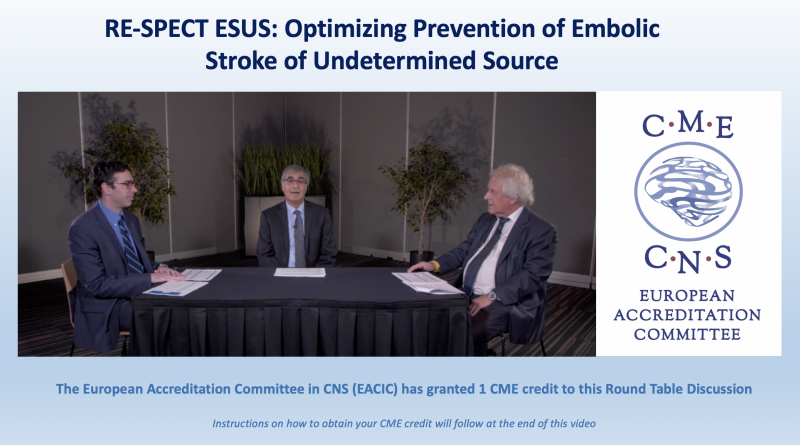
May 30, 2019
We would like to recommend to your attention a Round-Table discussion that held place at last year’s WSC in Montreal, Canada.
This Round Table Discussion reviews strategies for secondary prevention strategies in ESUS and the implications of the recent RE-SPECT ESUS results for clinical practice.
Following completion of this activity, learners will be able to:
- Describe RE-SPECT ESUS clinical trial results
- Outline the benefits and risks of NOACs in ESUS
- Discuss the implications of RE-SPECT ESUS for clinical practice
RE-SPECT ESUS: Optimizing Prevention of Embolic Stroke of Undetermined Source
Moderator:
Mike Sharma MD, MSc, Associate Professor, Division of Neurology, Department of Medicine, McMaster University, Ontario, Canada
Faculty:
Richard A. Bernstein MD, PhD, Professor of Neurology, Feinberg School of Medicine, Northwestern University, Illinois, USA
Hans-Christoph Diener MD, PhD, Professor of Neurology, University of Duisburg-Essen, Germany
Please click here to view video.





 “In our country, our patients are facing several problems after stroke. The number of physical therapy units is adequate, however, we should pay extra attention for the subjects such as lack of training and methods, inadequate speech rehabilitation therapy, lack of environmental physical conditions for stroke cases, and often overlooked dementia and depression after stroke” said Füsun Mayda Domaç, Assoc. Prof, MD, Msc and Vice President of BEYINDER, Turkish Stroke Support Organisation.
“In our country, our patients are facing several problems after stroke. The number of physical therapy units is adequate, however, we should pay extra attention for the subjects such as lack of training and methods, inadequate speech rehabilitation therapy, lack of environmental physical conditions for stroke cases, and often overlooked dementia and depression after stroke” said Füsun Mayda Domaç, Assoc. Prof, MD, Msc and Vice President of BEYINDER, Turkish Stroke Support Organisation.



